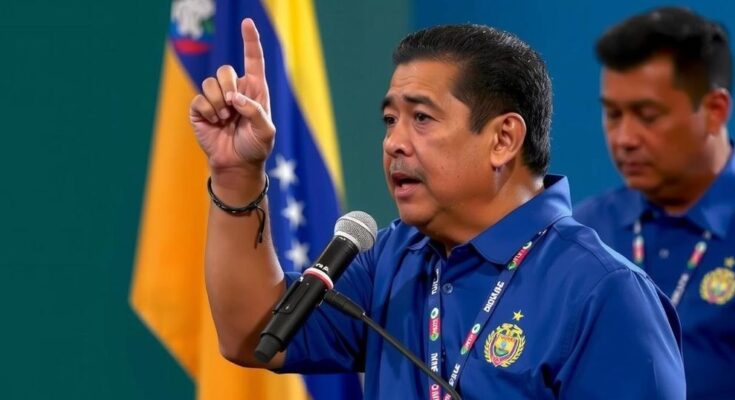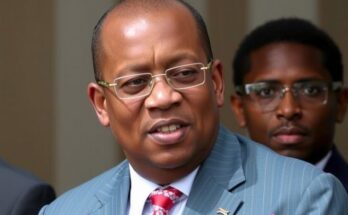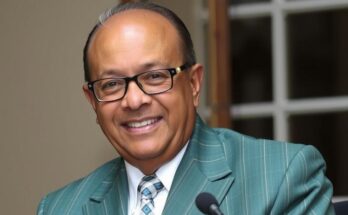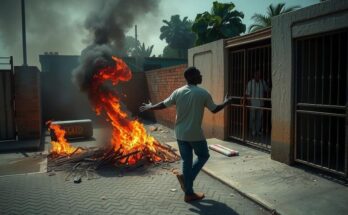Venezuelan opposition leader Maria Corina Machado has called upon Colombia’s President Gustavo Petro to recognize her faction’s victory in the disputed July presidential elections, emphasizing the need for decisive international action against Maduro’s regime. She asserts that her coalition possesses evidence contradicting the official results favoring Maduro, and warns of regional instability should he remain in power. Machado continues her advocacy from hiding, aiming to rally support for a transition in governance by January.
In a compelling call for international recognition of opposition electoral victories, Venezuelan opposition leader Maria Corina Machado has urged Colombia’s President Gustavo Petro to officially acknowledge her faction’s triumph in Venezuela’s contentious July presidential elections. Machado expressed these sentiments during a virtual address to the Colombian Senate, aiming to intensify global pressure on the current Venezuelan President Nicolás Maduro to resign by January. Machado, who has evaded capture and remained in hiding for two months due to threats of arrest, implored President Petro to take noteworthy action. “To the Government of Colombia, especially President Petro: It is time for decisions. Silence is no longer an option in the face of what is happening in Venezuela,” she stated. She highlighted the necessity for a political transition and showcased her coalition’s readiness to engage in respectful negotiations that reflect the will of the Venezuelan populace expressed during the elections on July 28. Claiming electoral victory, Machado’s opposition coalition contends that despite Maduro’s administration announcing him as the winner shortly after polls closed—without disclosing detailed results due to claims of a cyberattack—they possess vote tally sheets from over 80% of the electronic voting machines which suggest a significant victory for their candidate, Edmundo González. While addressing the Colombian senators, she urged for their backing: “To you, honourable senators, I ask you to be guarantors of our victory and to be the voice of those of us who today are facing the most atrocious and ruthless repression.” She further condemned the regime’s post-election conduct, which included detentions and alleged assaults on minors. Addressing regional dynamics, Machado cautioned against the repercussions for Colombia if Maduro remained in power for another six-year tenure. She claimed Venezuela has turned into a sanctuary for Colombian guerrilla groups under Maduro’s regime, positing challenges for President Petro’s peace agenda aimed at resolving conflicts with Colombian rebel factions, since his inauguration in 2022. In the wake of the elections, President Petro, alongside Brazilian President Luiz Inacio Lula da Silva and former Mexican President Andrés Manuel López Obrador, had undertaken attempts to mediate the electoral crisis. However, their initiatives were ultimately in vain as Maduro reinforced his hold on power through cabinet changes and the imprisonment of over 2,000 opposition figures. Edmundo González, previously a diplomat and opposition candidate, sought refuge in Spain in September after an arrest warrant was issued against him pertaining to the online circulation of vote tally sheets. While Maduro’s government has indicated its willingness to act as a guarantor in negotiations with Colombian insurgent groups, discussions with the National Liberation Army deteriorated earlier this year. The upcoming presidential term in Venezuela is slated to commence on January 10, as Machado persistently strives to galvanize international support against Maduro’s regime while remaining out of the media spotlight to ensure her safety.
The political landscape in Venezuela has been fraught with contention, particularly surrounding the legitimacy of its electoral processes. President Nicolás Maduro’s continued rule has faced challenges from opposition factions, most notably led by figures such as Maria Corina Machado, who assert that recent elections were marred by irregularities and governmental opposition. The international community, especially neighboring countries like Colombia, plays a crucial role in validating or contesting the outcomes of these elections. With significant concerns regarding human rights violations, political repression, and the influence of guerrilla groups emanating from Venezuela, there exists a pressing need for diplomatic engagement and intervention in the region.
Maria Corina Machado’s plea for support from Colombia illustrates the broader struggle for democracy in Venezuela amidst allegations of electoral fraud and oppressive governance under Nicolás Maduro. By appealing directly to Colombian leadership, Machado seeks to unite international voices against tyranny while highlighting the regional ramifications of continued Maduro rule. The situation remains volatile as the Venezuelan political saga unfolds, with pivotal decisions looming as the next presidential term approaches in January.
Original Source: www.oneindia.com




